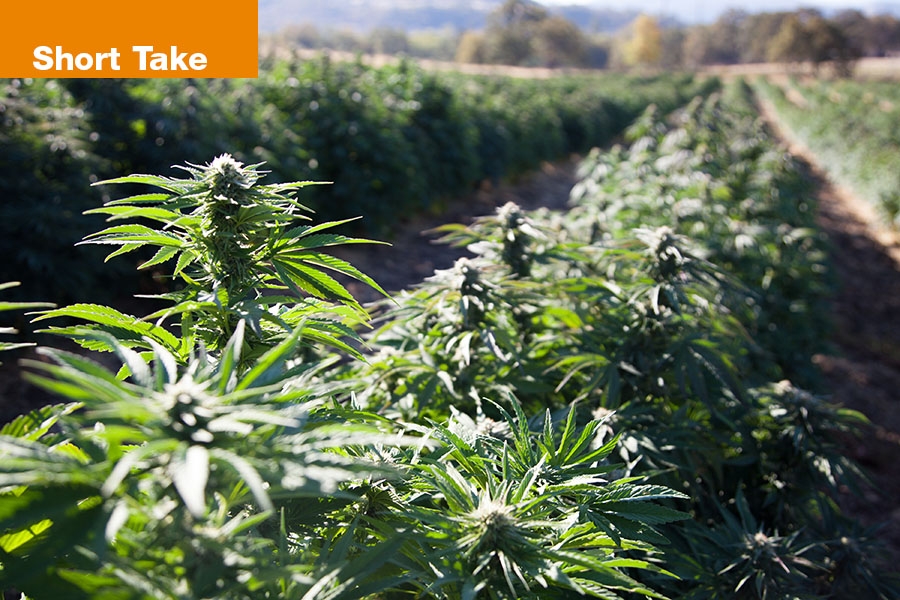Oregon’s cannabis industry may have recovered from the 2018 oversupply of product, but the entrance of large corporations to the sector and a sophisticated black market create headwinds.
In 2018 Oregon’s cannabis industry looked to be on the verge of a reality check.
Many marijuana businesses reported layoffs, including Chalice Farms, one of the largest Portland dispensaries, which cut its workforce by one-fifth.
It is no secret why times were tough for cannabis growers and retailers in 2018. During that year, the price of cannabis fell to the lowest levels since the state legalized recreational marijuana five years ago.
The price plummet came after a report by the Oregon Liquor Control Commission (OLCC), the state agency that regulates recreational marijuana.
The study claimed growers had produced enough product to satisfy demand for six years.
It’s only been one year since the report, but now the glut appears to be gone. Some retailers report shortages.
“In the past few months, it has been difficult to source flower,” says Anne Marie McClintock, retail purchasing manager at Golden Leaf Holdings, a Canadian company that owns several cannabis brands. “We are also anticipating less outdoor product being available as many growers have left and are now producing industrial hemp.”
The numbers support her conclusion. Today 62,000 acres of hemp are grown in Oregon, a 427% increase from one year ago.
Hemp is a cannabis plant like any other; the distinction is the tetrahydrocannabinol (THC) content, the psychoactive ingredient in the plant, which is lower in industrial hemp than in recreational marijuana.
Hemp was made federally legal in the 2018 Farm Bill. It is used to make oils and lotions, most notably cannabidiol (CBD) oil.
Facing a grim outlook due to the 2018 glut, it appears many growers made the switch. Being federally legal meant growers could sell their crops to a much wider national market.
So many growers switched to hemp, however, that there are now signs of a hemp glut as well. Prices for CBD oil, a popular hemp derivative, have fallen nearly 88% since 2012.
Oregon’s cannabis retailers were hit with another curveball this year when Gov. Kate Brown issued a temporary ban on all flavored cannabis vaping products.
The ban came in the wake of a rash of vaping-related illnesses and deaths.
The culprit of the vaping-related illnesses was eventually discovered to be vitamin E acetate, a cutting agent found mostly in black-market vaping products.
Though an appeals court granted a temporary stay on the ban, damage had been done to businesses that issued buybacks.
“It’s a lot easier to make money on the black market now because you can go online to a Chinese website and buy all the equipment you need, other than the actual cannabis,” says a former dispensary assistant manager, who chooses to remain anonymous.
“It’s gotten very sophisticated. You can be a chameleon right now on the black market because these products mimic the legal stuff. It’s very popular on college campuses.”
As black-market cannabis products find new ways to compete, temporary downturns, gluts and regulations have more potential to shut down small businesses. These market shifts give a leg up to larger brands that can withstand the impact, and a bigger share of the market once the dust settles.
For independent cannabis suppliers caught between larger corporations and the black market, new legislation could make the market more competitive.
The Secure and Fair Enforcement (SAFE) Banking Act, a bill co-sponsored by Sen. Jeff Merkley, passed the House of Representatives on Sept. 25, 2019.
If signed into law, the act would allow banking institutions to accept business from cannabis distributors without facing legal challenges.
The move could let shoppers use national credit and debit cards to buy cannabis, which some estimates, including a 2001 report by the Massachusetts Institute of Technology, claim could increase revenue by up to 20%.
“It’s gotten very sophisticated. You can be a chameleon right now on the black market because these products mimic the legal stuff. It’s very popular on college campuses.”
-Former dispensary assistant manager, who chose to remain anonymous.
Another piece of legislation that could help Oregon’s smaller cannabis businesses is the Clarifying Law Around Insurance of Marijuana Act. Just like banks, insurance companies cannot cover businesses that sell a federally illegal substance.
The bill would do for insurance companies what SAFE would do for banks, letting cannabis retailers provide protection for their employees and businesss like any other employer. Both bills have bipartisan support.
In the meantime, suppliers and states will innovative on their own. Nevada, for example, has devised an electronic token system to let shoppers buy cannabis with their credit cards.
Such a scheme could make its way to tech-savvy Oregon if Washington, D.C., doesn’t deliver.
To subscribe to Oregon Business, click here.









